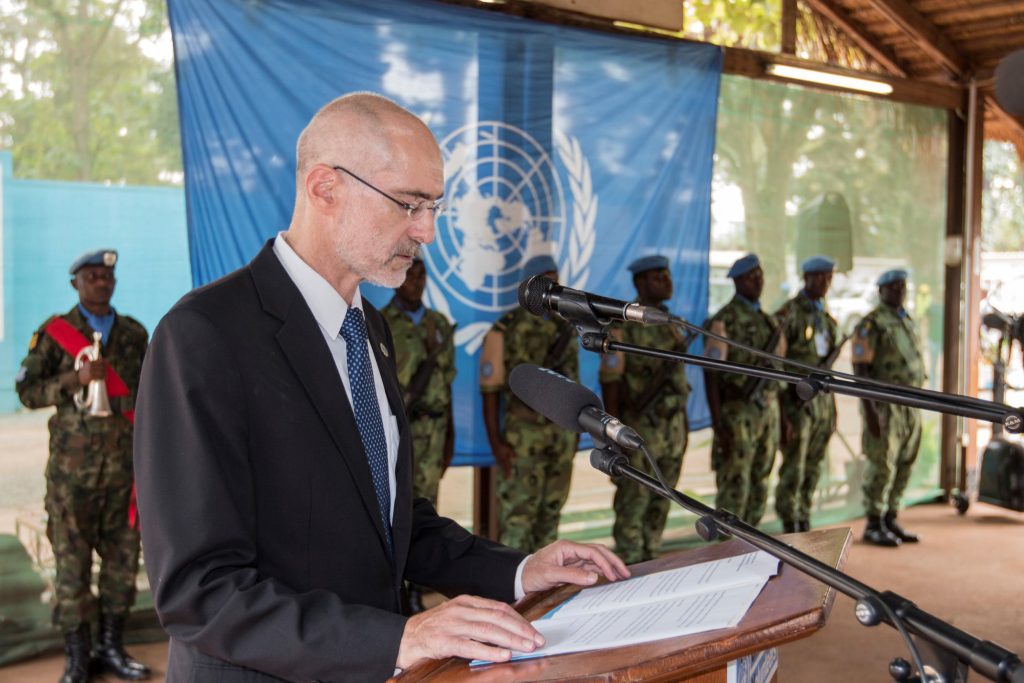As part of our “Americans in the UN” project to share the stories of Americans who work for the United Nations, we connected with Kenneth Gluck, the Deputy Special Representative and Deputy Head of the UN Multidimensional Integrated Stabilization Mission in the Central African Republic (MINUSCA).
Prior to joining UN Peacekeeping, Gluck served as Director of Operations for Médecins Sans Frontières. He started his career as a journalist for The Miami Herald, The Dallas Morning News, and magazines like The Nation, covering the wars that accompanied the breakup of the Soviet Union.
Originally from New York City, he earned a Bachelor’s degree in Sociology from Harvard University.
What is your message to Americans about the importance of the UN and UN Peacekeeping?
Kenneth Gluck: The United Nations is doing things in Central African Republic, which nobody else is willing to do. The world will not tolerate, and should not tolerate levels of violence, levels of mortality like we see in Central African Republic.
Americans should see the UN as providing an essential service to their neighbors, to people in other countries, to help them avoid violence, to help them build health care systems, to help them build police systems, like we’re doing in the Central African Republic. It’s a great investment. It’s a pleasure and an honor to work with people from all over the world who are trying, in difficult situations, to make sure that the world is a little less bad.
Do you have an example of how the UN has made a difference in someone’s life?
KG: The UN makes a difference every day in Central African Republic. Every time there’s fighting, people run to UN bases for protection. Because they know, despite all the criticism that we get, that when people are threatening their lives, when people are burning their villages, they know they can run to MINUSCA, and that MINUSCA will protect them. And this is a daily impact that MINUSCA has.
Do you have a favorite part of your job?
KG: The favorite part of my job is doing things I’ve never done before. This is my first peacekeeping operation.
In all of my humanitarian experience, we dealt with militaries, but mostly by trying to keep out of their way, trying to make sure that they didn’t hurt us. In most of my work as a mediator, we work with militaries, mostly trying to get them to observe international humanitarian law or stop fighting.
In a peacekeeping operation, the great thing for me, which is new, is working as a colleague with military officers, trying to see how military force can be used responsibly to protect people, to end violence, and to gradually help Central African Republic find stability with its own police, with its own army. And that’s the day we can leave.
How did you first learn about the United Nations?
KG: I first learned about the United Nations when I was a war correspondent, watching them do things in the field. Sometimes I was very critical. Later, when I was with Doctors Without Borders, I would see UN peace operations everywhere. It gave me a lot of inspiration to try to go into UN peacekeeping and try to do it better.
What motivates you to work for the United Nations?
KG: I spent many years as a journalist in conflict areas. And I spent many years with Doctors Without Borders. And as a humanitarian and as a war correspondent, the enormous frustration was all the things you can’t do. As a war correspondent, you can tell stories, but you’re not really changing the situation.
As a humanitarian, you’re definitely saving lives. You’re alleviating suffering. You’re having a real impact on people’s lives, but you’re not ending conflicts. You’re not stopping the wars that are going on that are causing all the suffering.
For me, entering the UN was an opportunity not just to save lives, which clearly is important, but to try to make a permanent, sustainable difference in the evolution of societies and ensuring that they’re going to be more peaceful.
Editor’s note: The interview was lightly edited for context and clarity.
Photo credit: UN/MINUSCA – Leonel Grothe

